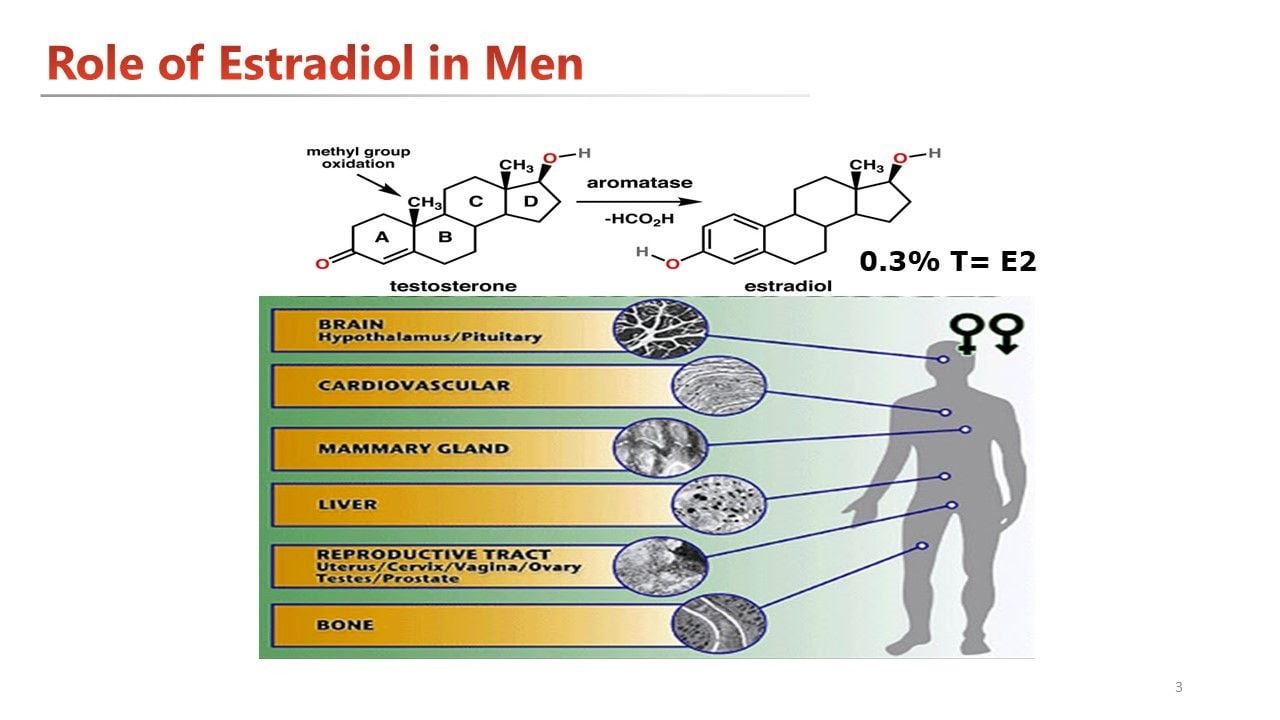For more details on this study, click:
Higher Estradiol, T and DHT correlated to higher libido in older hypogonadal men than T alone - Excel Male TRT Forum
Relation of Testosterone, Dihydrotestosterone, and Estradiol with Changes in Outcomes Measures in the Testosterone Trials (2022) Alisa J. Stephens-Shields, PhD, Peter J. Snyder, MD, Susan S. Ellenberg, PhD, Lynne Taylor, PhD, Shalender Bhasin, MB, BS Abstract Context. Many effects of...
Debunking Myths About Estradiol and Testosterone Therapy
Insights from a Groundbreaking Study on Older Men
Hello everyone, Nelson Vergel here from ExcelMale.com and DiscountedLabs.com. Today, I want to dive into a topic that continues to spark debate—estradiol and its impact on men undergoing testosterone replacement therapy (TRT). There's a lot of misinformation floating around, so I want to clear things up using the latest and most significant research in the field.
The study I’ll be discussing was conducted by Dr. Shalender Bhasin, a leading researcher in this space for the past 25–30 years. What makes this study particularly valuable is that it was funded by the U.S. National Institutes of Health (NIH) and focused on older men (65+ years old) using testosterone therapy. Despite its importance, it hasn't received the attention it deserves—so let's break it down.
Study Overview: TRT in Older Men
This year-long study followed 788 men over 65 with low testosterone levels (<275 ng/dL). The goal was to evaluate how testosterone gel (AndroGel 1%) affected various health markers, including:
- Hemoglobin
- HDL cholesterol (the "good" cholesterol)
- Bone density
- Sexual desire
- Prostate-specific antigen (PSA)
Some participants were given a placebo gel, while others had their doses adjusted up to 15 grams per day to reach a target testosterone level (~350–400 ng/dL).
Additionally, the study had multiple sub-trials, investigating:
- Physical function (strength, walking speed)
- Sexual function
- Vitality and cognitive function
- Bone density changes (via DEXA scans)
Key Findings: The Role of Estradiol in TRT
The results of this study were eye-opening and challenge many common beliefs about testosterone and estradiol.
1. Higher Estradiol Levels Increased Hemoglobin & Sexual Desire
One of the biggest surprises was that higher estradiol levels correlated with increased hemoglobin and greater sexual desire.
- Men with the highest estradiol increases had the biggest hemoglobin increases.
- Sexual desire was significantly higher in men with more estradiol.
This contradicts the widely held belief that lower estradiol improves sexual function. Instead, the data suggests that men who let their estradiol rise naturally on TRT experience better sexual function and energy levels.
2. Estradiol Also Lowered HDL (Unexpectedly)
While estradiol is often associated with better lipid profiles, this study found that higher estradiol levels actually led to greater reductions in HDL cholesterol.
This was unexpected, and even Dr. Bhasin and his team were surprised by the finding. However, it suggests that estradiol plays a more complex role in cardiovascular health than previously thought.
3. Bone Density Increased with Higher Estradiol
This was expected and supports what we already know—estradiol is crucial for maintaining strong bones. The study confirmed that bone mineral density improved significantly in men with higher estradiol levels.
4. Testosterone Alone Had Little Effect on Sexual Desire
Surprisingly, total testosterone levels alone did not strongly correlate with increased sexual desire. Instead, the biggest improvements were seen in men with:
- Higher estradiol
- Higher DHT (dihydrotestosterone)
This challenges the idea that simply raising testosterone will automatically boost libido. The evidence suggests that both estradiol and DHT are essential for optimal sexual function.
5. No Significant Impact of Estradiol on PSA Levels
Despite concerns that estradiol might increase PSA (a marker for prostate issues), the study found no significant link. This further supports the idea that estrogen does not increase prostate cancer risk, contrary to outdated beliefs.
What This Means for Men on TRT
The biggest takeaway? Estradiol is not the enemy. In fact, it plays a key role in sexual function, bone health, and overall well-being.
However, many doctors and clinics continue to prescribe aromatase inhibitors (AIs) like Anastrozole to block estradiol, often unnecessarily. The belief that lowering estradiol improves sexual function is simply not supported by research.
When Should Estradiol Be Controlled?
The only valid reason to block estradiol is if someone experiences severe gynecomastia (breast tissue growth), which is rare in men with balanced testosterone levels. Otherwise, let your estradiol rise naturally on TRT.
Final Thoughts: A Wake-Up Call for the TRT Community
This study confirms what I’ve been saying for years—the fear of estradiol is overblown. Many TRT clinics and telemedicine providers routinely prescribe Anastrozole, but this study proves that higher estradiol is actually beneficial.
Who Conducted the Study?
The research was published by the Endocrine Society and led by Dr. Shalender Bhasin, a respected expert who has been studying testosterone for decades. He was also behind the famous 600 mg/week testosterone study in the 1990s, which helped shape modern TRT protocols.
Want to Learn More?
Subscribe to my YouTube channel: ExcelMale YouTube
Join the discussion: ExcelMale.com – the largest moderated TRT forum.
Order lab tests without a doctor’s visit: DiscountedLabs.com (available in most U.S. states).
I hope you found this review helpful. If you’re on TRT, stop fearing estradiol—embrace it (unless you have specific medical reasons to lower it).
Last edited:















